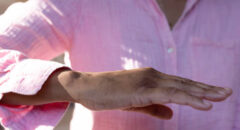
Rigid muscles, an all too common and pretty debilitating symptom of Tardive Dyskinesia (TD), can severely impact your daily life. Black people in the United States are almost twice as likely as white people to develop TD.
With this being said, finding effective management techniques is vital.
Tai Chi, a gentle exercise that combines fluid movements and breath coordination, might be a potential solution for those seeking relief from muscle rigidity.
Today BlackDoctor.Org will explore five ways Tai Chi can help alleviate this symptom, based on the experiences of Jeff Shair, a Tardive Dyskinesia advocate at a pharmaceutical company. Shair’s story was featured in the March 2007 issue of the National Spasmodic Torticollis Association Magazine.
1. Better Breathing and Cardiovascular Health
One of the most profound benefits of Tai Chi for those with TD is being able to practice better breathing. Jeff Shair, who suffers from both TD and Generalized Dystonia, experienced severe respiratory problems. He typically found himself gasping for air after brief strolls, attracting concerned attention from bystanders who thought he might be having an asthma or heart attack.
After joining the Golden Breath American Tai Chi class in Philadelphia, Shair noticed a significant improvement in his breathing. Tai Chi’s emphasis on breath control and fluid movement enhances cardiovascular health, making it easier for practitioners to breathe deeply and efficiently. This improvement in respiratory function is especially beneficial for Black Americans, who statistically suffer from larger rates of respiratory illnesses.
2. Say Hello to More Mobility, and Less Muscle Rigidity
Rigid muscles can severely limit mobility, but Tai Chi’s slow, deliberate movements help boost flexibility while reducing any stiffness. Shair recalls his struggle with walking as a result of TD-induced muscle rigidity.
Before practicing Tai Chi, he would usually walk on the tips of his toes with a distinctive rocking gait. After doing Tai Chi on the regular, he found his stride became more fluid and his gait much more natural. For Black Americans, who may experience higher levels of muscle stiffness from prolonged medication use and lack of accessibility to quality healthcare, Tai Chi offers a natural way to improve mobility and overall physical function.
Tardive dyskinesia (TD) is generally caused by long-term use of antipsychotic or anti-nausea medications.
TD consists of involuntary, repetitive movements of the face, trunk, and extremities, including:
- Lip smacking or puckering
- Uncontrollable blinking of the eyes
- Facial grimaces
- Tongue protruding
- Jerking of the arms or legs
- Slow, writhing movements of the neck or trunk
Certain Black people have genetic variations that slow the metabolism of antipsychotic drugs, making them more likely to experience adverse effects and develop TD.
On top of that, studies suggest that doctors prescribe first-generation antipsychotics to Black Americans more frequently compared to Caucasian Americans, despite the availability of second-generation drugs that are less likely to lead to TD.
RELATED: How Sitting Tai Chi Helps Stroke Survivors Recover
3. Take Control With Improved Balance and Coordination
Falls and injuries due to poor balance are common among those with TD. Tai Chi helps improve balance and coordination by focusing on controlled movements and body awareness.
Shair experienced a huge improvement in his balance, preventing potential falls and injuries that could have led him to the hospital. This benefit is imperative, particularly for elderly Black folk, who are more prone to falls and fractures. Improved balance from Tai Chi can significantly decrease the likelihood of injury and improve quality of life.
4. Supports Mental and Emotional Well-being
Tai Chi not only benefits the body but also the mind. Shair noted serious improvements in his focus, short-term memory, and mental clarity as a whole.
The meditative aspect of Tai Chi helps reduce stress, anxiety, and depression—common problems that anyone with chronic illnesses like TD goes through. Randomized controlled trials (RCTs) have shown that Tai Chi may improve bone density, cardiopulmonary health, arthritis, fibromyalgia, tension headaches, and other medical conditions.
Considering the relationship between physical and mental health, improvements in your physical health or reductions of chronic disease symptoms could help positively impact your mental health. Chronic physical health problems are linked to stress, anxiety, depression, and poor moods.
5. Weight Management and Increased Energy
Maintaining a healthy weight can be tough for people with TD due to limited mobility and medication side effects. Tai Chi, with its low-impact exercises, helps increase metabolism and promote weight loss.
Shair reported a consistent weight loss of 20-25 pounds after practicing Tai Chi, along with better muscle tone and overall fitness. Regular Tai Chi practice can help manage weight, improve muscle tone, and boost energy levels, contributing to a healthier lifestyle.
Takeaway
Tai Chi offers a multifaceted approach when it comes to managing rigid muscles and other symptoms of Tardive Dyskinesia. Tai Chi provides a valuable tool for anyone looking to improve both their physical and mental health.
By incorporating Tai Chi into your routine, you can breathe better, move more smoothly, achieve more balance, find mental clarity, and keep your weight healthy and in check. Jeff Shair’s story is a testament to the power of Tai Chi, and we hope his experience inspires you or someone you love with TD that there are ways to feel better and live better despite your condition.








